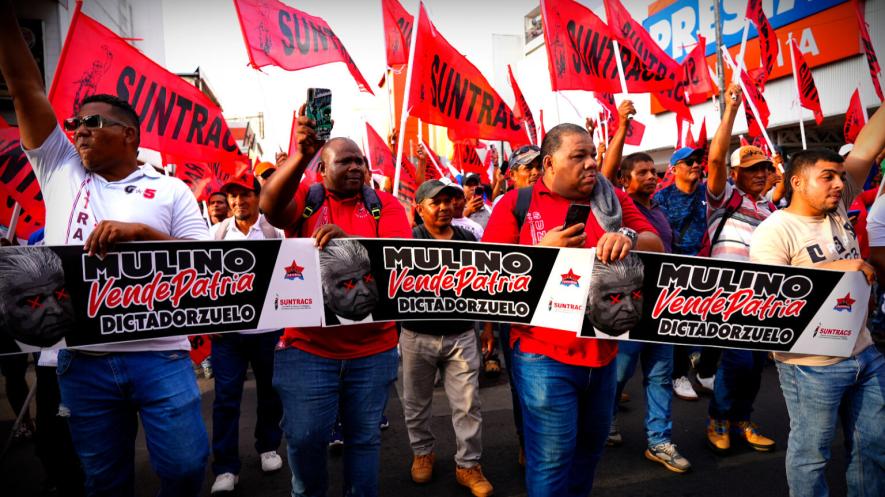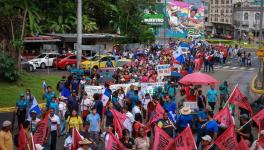Panamanians Gear up For Indefinite Strike on April 28

Members of SUNTRACS mobilizing on April 24. Photo: SUNTRACS
On April 24, thousands of Panamanians took to the streets to protest the recent approval of the pension reform in Panama promoted by the neoliberal government of José Raúl Mulino. Law 462 has been the source of a lot of controversy in the Central American country because, according to several unions, it will reduce retirement pensions compared to the previous system. The mobilization was called by the Association of Professors of Panama (ASOPROF) and the Single National Union of Industry and Construction and Similar Workers (SUNTRACS), who have announced that they will embark on an indefinite national strike on April 28.
“The organized people demand the repeal of Law 462 of the Social Security Fund, which imposes an increase in pension contributions, increases the retirement age, and decreases the collection of pensions, in addition to granting the financial system, largely private, billions of dollars, to benefit the financial sector close to the government of President José Raúl Mulino,” says Rolando Ortiz, sub-coordinator of the National Front for the Defense of Economic and Social Rights of Panama (Frenadeso).
SUNTRACS General Secretary, Saúl Méndez stated: “[Panama], together with Suntracs and the teachers, [will go to the] indefinite national strike of the construction industry…Get ready to support the teachers and the indefinite national strike. The strike is of the Panamanian people, the whole country must mobilize. We must go out in the neighborhoods, in the communities, buildings, houses, and the countryside; we all must go out to the streets to confront the dictator.”
Consejo Nacional del SUNTRACS.
Se reunieron todas las estructuras de nuestra organización para debatir y tomar decisiones claves. ¡La unidad y organización son nuestra mayor fuerza!— Suntracs Panama April 25, 2025
In defense of Panamanian sovereignty
In addition, teachers and workers announced that the mobilizations are intended to denounce the security cooperation agreements between the Panamanian Security Secretariat and the US Department of Defense, which were reached after the pressure exerted by the Trump administration regarding the Panama Canal. According to Ortiz, the agreement contemplates the surrender of Panamanian territory for the establishment of US military bases.
In this regard, the leader of the teachers’ union ASOPROF, Diógenes Sánchez, said: “The government has been infamously guaranteeing the US military presence…with the signing of an agreement that allows US military intervention and presence in our country, an affront to the dignity and memory of all Panamanians who sacrificed their lives so that Panama would have a single territory and a single flag.”
For protection of the environment
Similarly, the protesters opposed the possible reopening of the open-pit copper mining project on the Caribbean coast by the Mulino government. In 2023, Panama’s Supreme Court declared the 20-year concession of copper exploitation to a private Canadian company called First Quantum Minerals unconstitutional and the mine was closed.
The suspension came after mass protests in late 2023, in which thousands of Panamanians participated, disrupting plans for one of the world’s largest copper mining projects. The concession was widely criticized in Panama, with people citing both the negative environmental consequences the open-pit mine would have, as well as the exorbitant profits the Canadian mining company would extract.
However, following the closure of the project, First Quantum Minerals filed two lawsuits in international courts in which it claims to have invested close to USD 10 billion, making this project the largest private foreign investment in the country’s history, second only to the Panama Canal. The suits were suspended last month, but movements have warned that the battle is not over.
In this regard, SUNTRACS published in X: “This April 24, thousands of us marched throughout the country with a clear message: No to mining, no to the high cost of living, no to starvation pensions and defense of sovereignty.”
Ortiz also informed that one of the demands of the demonstrators was also respect for the water sources for the use of the peasants: “[We mobilized] also against the possible damming of the Indio River, a river that wants to be dammed to supply more water to the Panama Canal, attacking thousands of peasants who have lived for dozens of years on the banks of the river and now this measure is imposed on them without attention to their just demands.”
For now, a tense calm is expected until Monday, April 28, when the strike of teachers and construction workers will begin. Once again, the unions and the national government will measure forces in a struggle between the defense of sovereignty and public institutions versus the private and foreign interests that are hovering over the Central American country.
Courtesy: Peoples Dispatch
Get the latest reports & analysis with people's perspective on Protests, movements & deep analytical videos, discussions of the current affairs in your Telegram app. Subscribe to NewsClick's Telegram channel & get Real-Time updates on stories, as they get published on our website.

















